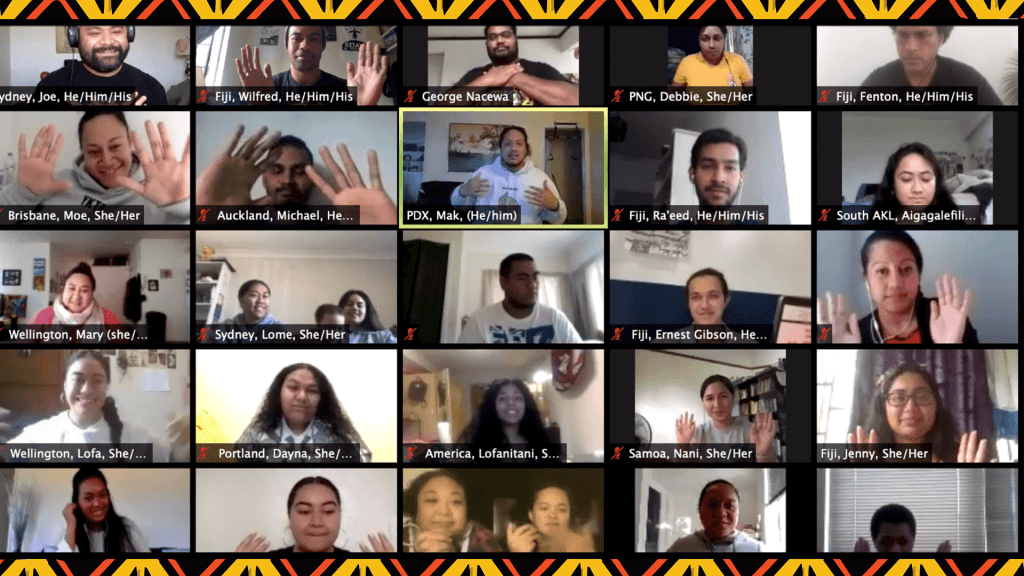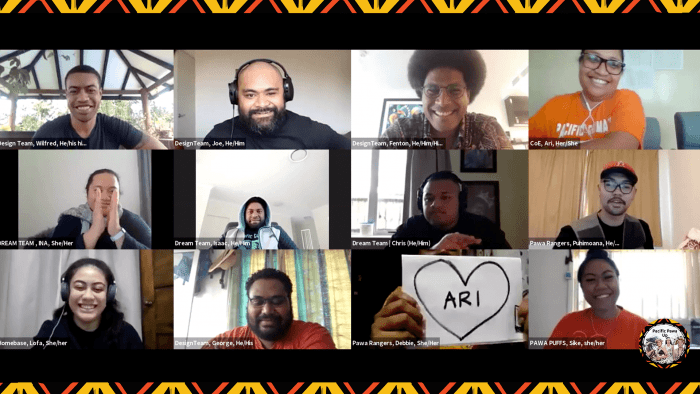350
Pacific Pawa Up Fellowship
2020
May – July 2020
What does organizing in the time of COVID 19 look like for the Pacific? This is a question we’ve been thinking hard about and taking the time to really navigate with good care. Our reflections on this moment have guided our approach to staying connected and being in community during this global pandemic.
Part of being in community with the Pacific Climate Warriors (PCW) is doing the work required to build and strengthen resilience systems that they can rely on. Resilience systems that ensure they are well equipped to adapt to this new way of being in community, this new way of working, this new way of organizing in online spaces and on digital platforms.

With these systems of resilience we’re building for the PCWs, we are adding to their skills in online engagement, providing them digital empowerment and allowing them to stay connected with their teams in new ways during these uncertain times.
What the Pacific Pawa Up Fellowship will do is build the absorptive, adaptive and transformative resilience of the PCWs. We want to empower them to take required actions to cope with uncertainties, make gradual adjustments to their old ways of working and finally, make intentional changes to better set themselves up for this new digital way of working across the Pacific.
Building our approach to digital empowerment means building our resilience to a changing world and ensuring we are doing our part to center justice and inclusive development for our people. No one gets left behind.
With no one being left behind we get to scale up our efforts to;
- Inspire individuals to take action and grow leadership
- Diversify, support, link and grow groups within the Pacific climate movement and beyond
- Shift narratives on climate action and climate justice (so that we can)
- Dismantle pillars of support of the Fossil Fuel Industry
Our Goals
Network Strengthening
Be in a space that can support the strengthening of our Pacific Climate Warriors network. From seasoned Warriors to new Warriors, this will be an opportunity to learn about, and from, each other. Strengthen our foundation and coordinate to allow for collaborative network-wide strategies to build Pacific Pawa.
Skill Up
Build the capacity of our Warriors to adapt to these new ways of working in order to scale up their efforts to take on the fossil fuel industry and build resilient communities by sharing frontline truths, strategies, and campaign knowledge from on-the-ground organizing in your communities.
Reflect and Evaluate
Look back on the journey of the Pacific Climate Warriors in the climate movement so far. Review and celebrate the diversity of tactics and the depth of the work and make time to really acknowledge how far we have come and how big we are getting.
Future Building
Re-center on the priorities of our Pacific Pawa, then build community resilience, movement power, political alignment, and analysis and keep telling a powerful story of why Pacific Climate Warriors are needed in this world.
Module 1 : Orientation
In our orientation session, we really wanted to spend some time building a foundation for this fellowship. We introduced ourselves, our teams, we collected some data and we went over our goals, our hopes and our fears for the Pacific Pawa Up Fellowship series.
Module 2 : Pre-Training
Our pre-training session was an opportunity to look back at some of our history, our DNA, we heard from our Council of Elders and drew from those stories some lessons that are true to guiding our work today. We also spent some time going over our different structures and some of the resources and tools we can use to assess the health of our teams and why doing that especially at points of re-calibration are so important.
Module 3 : Organizing and Engagement
What does organizing in our communities looks like? During this session, we took our cohort through container agreements to set themselves up for success throughout this journey. We also got to hear stories from 350 Pacific Organizer, George Nacewa and our Council of Elder, Youth Representative, Brianna Fruean on their experiences as organizers in their communities. We pulled lessons from their stories and participants broke out into groups to discuss key takeaways that could apply to their communities.
Module 4 : Strategizing
Campaigns are a powerful way of strategically building group capacity and developing experience. At the same time, campaigns win solid victories for social justice. In this module, we got to hear from our 350.org Pacific Campaigner, Joseph Sikulu on his experience on a campaign that helped shape the person he is today and taking lessons from those experience to be able to effectively strategize for future campaigns. This was an opportunity for the cohort to identify various tactics that make a campaign successful and exercise how to effectively strategize using paper plates challenge to build a campaign plan.
Module 5 : Storytelling
Our world truly is defined by the stories we tell. We create stories to help ourselves, and those around us, understand the world we live in. In this module, we got to understand why leadership storytelling is so important in the work we do, we learnt about our Life Map and shared a number of elements that we’d consider when drawing up our Life Map. We also got to hear from Arianne Kassman who showcased her Life Map and shared her story. We also touch on the Story of Self, Us and Now and the Design team explicitly made an offering of providing one on one coaching to anyone of the cohort that were interested in developing their leadership story further.
During this module, there was a lot interpersonal sharing and out of respect for those who shared, we won’t be sharing the video from this training.

Module 6 : Digital Storytelling I
Storytelling helps us share our truths and bring more people into our work. Telling authentic stories can help ignite change and bring more attention to our work. Anyone can be a digital storyteller. You just need access to a basic mobile phone. People can be in control of their own stories. In this module, we got to hear from Fenton on his experiences doing digital storytelling and running a number of effective and successful digital campaigns which included the Frontline Truths and Have You Sei campaign. During our skillshare, we went through the importance and effectiveness of digital storytelling and specifically focused on Text, Photo and Video as ways to tell a story online.
Module 7 : Digital Storytelling II
Social media is like any other organizing, grounded in goals and strategy and depends entirely on building authentic relationships. In this module, we looked at the importance of social media as a powerful tool to connect and communicate with our networks. We are movement storytellers, not just a reporter of facts. Each social media post should be part of the story of our campaign, which in turn makes up the story of our movement. A lot of people we know are on social media. Meet them where they’re at. During this session, we also covered a number of tips and tricks using social media and doing live coverage for any form of event, action and/or gathering in our communities.
Talanoa : Storytelling in our community
In order to continue to enrich the growth of our Pacific Pawa Up Fellowship and continue to diversify the way we breakdown information and socialise the concepts we are teaching we are committed to exploring and landing our modules through story and Talanoa.
These Talanoa are an opportunity for our cohort and our network to hear from our partners and allies who will share their experiences and knowledge linked to the module we have just completed.
Module 8 : Communications
Communication is central and vital to all human activities, including social and grassroots mobilization and development.
Traditional media channels reflect a people’s culture, play a key role in shaping public opinion and more importantly, raise awareness on current issues, whilst reaching audiences both online and offline.
The most common forms of traditional media include radio, television, printed newspapers and magazines.
As a climate activist, you will be bombarded with opportunities to engage with media and share your personal stories and opinions on what needs to happen to end the climate crisis. This module focuses on 4 essential skills that you can use to maximise media opportunities. Module 8: Communications Skill-Share
Module 9 : COP – UNFCCC Training
COP spaces can be very daunting and sometimes unfriendly to those participating in the yearly event for the first time. During this module, we got to hear from Joseph Sapati Moeono-Kolio, Genevieve Jiva and Kathy Jetnil-Kijiner on their experiences from COP over the years. Providing insights on how to prepare well for COP and navigating through the different spaces during COP.
Pacific Pawa Up Fellowship 2020 Graduation
A big congratulations to our very first Pacific Pawa Up Fellowship cohort who graduated. It has been an amazing journey working, learning and growing with these incredible young leaders and we are sure to see big things come to light in the work they do with their communities. During our graduation, we opened the space with a traditional Kava ceremony, we had special performances by Mia Kami and the Pasifika Voices and we also got to hear each graduate’s experiences and reflections from the past 3 months with us.
To learn more about the Fellowship, please read our reports available below.
READ our Pacific Pawa Up Fellowship Full Review
READ our Pacific Pawa Up Fellowship Review


